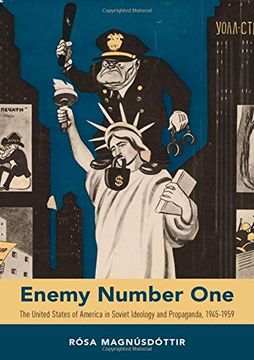Compartir
Enemy Number One: The United States of America in Soviet Ideology and Propaganda, 1945-1959 (en Inglés)
Rósa Magnúsdóttir (Autor)
·
Oup Usa
· Tapa Dura
Enemy Number One: The United States of America in Soviet Ideology and Propaganda, 1945-1959 (en Inglés) - Rósa Magnúsdóttir
$ 105.00
$ 142.50
Ahorras: $ 37.50
Elige la lista en la que quieres agregar tu producto o crea una nueva lista
✓ Producto agregado correctamente a la lista de deseos.
Ir a Mis ListasSe enviará desde nuestra bodega entre el
Lunes 13 de Mayo y el
Martes 14 de Mayo.
Lo recibirás en cualquier lugar de Estados Unidos entre 1 y 3 días hábiles luego del envío.
Reseña del libro "Enemy Number One: The United States of America in Soviet Ideology and Propaganda, 1945-1959 (en Inglés)"
Enemy Number One tells the story of the Soviet cultural and propaganda apparatus and its efforts to control information about the United States in the postwar landscape. Beginning with the 1945 meeting of American and Soviet troops on the Elbe, this period saw cultural relations develop in close connection to oppression as the Soviet authorities attempted to contain and appropriate images of the United States. Rósa Magnúsdóttir analyzes two official narratives about the USSR's "enemy number one" --Stalin's anti-American campaign and Khrushchev's policy of peaceful coexistence--and shows how each relied on the legacy of the wartime alliance in their approach. Stalin used the wartime experience to spread fear of a renewed war, while Khrushchev used the wartime alliance as proof that the two superpowers could work together.Drawing from extensive archival resources, Magnúsdóttir brings to life the propaganda warriors and ideological chiefs of the early Cold War period in the Soviet Union, revealing their confusion and insecurities as they attempted to navigate the uncertain world of late Stalin and early Khrushchev cultural bureaucracy. She also demonstrates how concerned Soviet authorities were by their people's presumed interest in the United States, resorting to monitoring and even repression-behavior indicative of the inferiority complex of the Soviet project as it related to the outside world.
- 0% (0)
- 0% (0)
- 0% (0)
- 0% (0)
- 0% (0)
Todos los libros de nuestro catálogo son Originales.
El libro está escrito en Inglés.
La encuadernación de esta edición es Tapa Dura.
✓ Producto agregado correctamente al carro, Ir a Pagar.

